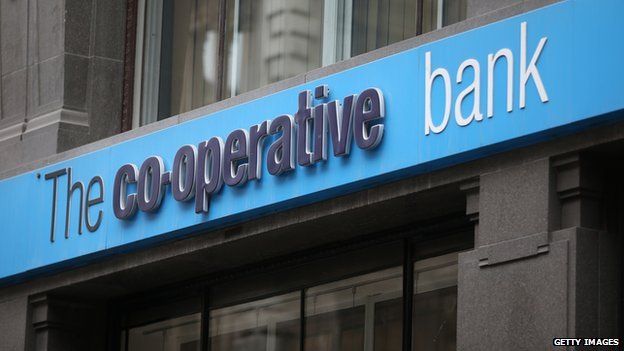Co-op Group members vote in favour of reforms
- Published

Members of the troubled Co-operative Group have voted in favour of reforming how the business is run.
The group has been in turmoil since a £1.5bn hole emerged in its finances last year, forcing it to sell off parts or all of its farming, pharmacies and banking divisions.
Changes to the structure of the board were proposed, but had met stiff resistance from some key figures.
But 83.7% of members voted in favour of the changes.
The plans were proposed by former City minister Lord Myners and were accepted in principle in May.
Lord Myners had blamed the structure of the Co-op Group's board for much of the chaos surrounding the business.
Among the changes:
- A group board of 11 people will be set up, with a majority of independent directors. This has been reduced from 20 people previously
- The board will comprise an independent non-executive chair, five independent non-executive directors, two executive directors (including the group chief executive) and three member-nominated directors
- A council will represent members and act as the group's guardian. The body, to comprise a maximum of 100 members, will have power to hold the group board to account
- A senate, elected by the council, will help co-ordinate the activities of the council and act as a nexus for interactions between the council, the board, the executive and members.
Ursula Lidbetter, chair of the Co-operative Group, called it a "momentous and defining moment".
"These reforms represent the final crucial step in delivering the change necessary to return the group to health," she said.
Patrick Gray, president of the Midcounties Co-op which opposed the original changes from Lord Myners, said the vote was "not necessarily the end of the matter but rather the beginning of a new phase".
He described the process as "exhausting".
"The effort now is to make new Co-op both commercial and ethical. It's possible but difficult to achieve and depends on how the new [commercially focused] board gets along with the also new [members'] council."
More business acumen
Following the discovery of the £1.5bn black hole in 2013, a deal was reached which saw the wider Co-op Group cede majority ownership of the bank to bondholders, including a number of US hedge funds.
In a separate scandal before the bank had to be rescued, revelations emerged about the bank's disgraced former chairman Paul Flowers, who pleaded guilty to drugs possession in May.
BBC business correspondent Joe Lynam said: "Today's vote is basically reinventing how the Co-op is run, putting it on a more commercial footing while retaining crucially the ethical background to the Co-Operative movement - the fact that it cannot be turned into a company at some stage in the future, that is one of the safeguards."
He added: "It will still very much be an ethically focused, members-driven organisation but with far more business acumen and experience going forward.
"That doesn't mean that there won't be a residue of a split-type movement - there are a lot of people who were very resistant to this change."
- Published22 August 2014
- Published9 May 2014
- Published7 May 2014
- Published11 April 2014